The Machine Learning Solutions Architect Handbook: Practical strategies and best practices on the ML lifecycle, system design, MLOps, and generative AI 302519
Код товару: 302519Паперова книга
-
ISBN978-1805122500
-
Бренд
-
Автор
-
Рік2024
-
МоваАнглійська
-
ІлюстраціїЧорно-білі
Design, build, and secure scalable machine learning (ML) systems to solve real-world business problems with Python and AWS
Key Features
- Go in-depth into the ML lifecycle, from ideation and data management to deployment and scaling
- Apply risk management techniques in the ML lifecycle and design architectural patterns for various ML platforms and solutions
- Understand the generative AI lifecycle, its core technologies, and implementation risks
Book Description
David Ping, Head of GenAI and ML Solution Architecture for global industries at AWS, provides expert insights and practical examples to help you become a proficient ML solutions architect, linking technical architecture to business-related skills.
You'll learn about ML algorithms, cloud infrastructure, system design, MLOps , and how to apply ML to solve real-world business problems. David explains the generative AI project lifecycle and examines Retrieval Augmented Generation (RAG), an effective architecture pattern for generative AI applications. You’ll also learn about open-source technologies, such as Kubernetes/Kubeflow, for building a data science environment and ML pipelines before building an enterprise ML architecture using AWS. As well as ML risk management and the different stages of AI/ML adoption, the biggest new addition to the handbook is the deep exploration of generative AI.
By the end of this book , you’ll have gained a comprehensive understanding of AI/ML across all key aspects, including business use cases, data science, real-world solution architecture, risk management, and governance. You’ll possess the skills to design and construct ML solutions that effectively cater to common use cases and follow established ML architecture patterns, enabling you to excel as a true professional in the field.
What you will learn
- Apply ML methodologies to solve business problems across industries
- Design a practical enterprise ML platform architecture
- Gain an understanding of AI risk management frameworks and techniques
- Build an end-to-end data management architecture using AWS
- Train large-scale ML models and optimize model inference latency
- Create a business application using artificial intelligence services and custom models
- Dive into generative AI with use cases, architecture patterns, and RAG
Who this book is for
This book is for solutions architects working on ML projects, ML engineers transitioning to ML solution architect roles, and MLOps engineers. Additionally, data scientists and analysts who want to enhance their practical knowledge of ML systems engineering, as well as AI/ML product managers and risk officers who want to gain an understanding of ML solutions and AI risk management, will also find this book useful. A basic knowledge of Python, AWS, linear algebra, probability, and cloud infrastructure is required before you get started with this handbook.
About the Author
David Ping is an accomplished author and industry expert with over 28 years of experience in the field of data science and technology. He currently serves as the leader of a team of highly skilled data scientists and AI/ML solutions architects at AWS. In this role, he assists organizations worldwide in designing and implementing impactful AI/ML solutions to drive business success. David's extensive expertise spans a range of technical domains, including data science, ML solution and platform design, data management, AI risk, and AI governance. Prior to joining AWS, David held positions in renowned organizations such as JPMorgan, Credit Suisse, and Intel Corporation, where he contributed to the advancements of science and technology through engineering and leadership roles. With his wealth of experience and diverse skill set, David brings a unique perspective and invaluable insights to the field of AI/ML.
1'400 ₴
Купити
Monobank
от 157 ₴ / міс.
до 10 платежей
Покупка частинами Monobank
₴ / місяць
Для використання функції «Покупка частинами» необхідно мати картку Monobank.
Розділивши оплату на певну кількість платежів (від 3 до 10),
ви платите лише одну частину. Решта – раз на місяць списуватиметься з вашої карти.
Послуга може бути використана при замовлення на суму від 600 грн.
Увага! При покупці частинами знижки на товари не враховуються.
Щоб скористатися цією функцією, додайте в кошик товарів на суму від 600 грн.
На сторінці оформлення замовлення вкажіть спосіб оплати «Покупка частинами Monobank». Підтвердьте покупку у програмі Monobank.
-
Нова ПоштаБезкоштовно від
3'000,00 ₴ -
УкрпоштаБезкоштовно від
1'000,00 ₴ -
Meest ПоштаБезкоштовно від
3'000,00 ₴
Характеристики
- Бренд
- Автор
- КатегоріяПрограмування
- Рік2024
- Сторінок602
- Формат190х235 мм
- ОбкладинкаМ'яка
- Тип паперуОфсетний
- МоваАнглійська
- ІлюстраціїЧорно-білі
Від видавця
Design, build, and secure scalable machine learning (ML) systems to solve real-world business problems with Python and AWS
Key Features
- Go in-depth into the ML lifecycle, from ideation and data management to deployment and scaling
- Apply risk management techniques in the ML lifecycle and design architectural patterns for various ML platforms and solutions
- Understand the generative AI lifecycle, its core technologies, and implementation risks
Book Description
David Ping, Head of GenAI and ML Solution Architecture for global industries at AWS, provides expert insights and practical examples to help you become a proficient ML solutions architect, linking technical architecture to business-related skills.
You'll learn about ML algorithms, cloud infrastructure, system design, MLOps , and how to apply ML to solve real-world business problems. David explains the generative AI project lifecycle and examines Retrieval Augmented Generation (RAG), an effective architecture pattern for generative AI applications. You’ll also learn about open-source technologies, such as Kubernetes/Kubeflow, for building a data science environment and ML pipelines before building an enterprise ML architecture using AWS. As well as ML risk management and the different stages of AI/ML adoption, the biggest new addition to the handbook is the deep exploration of generative AI.
By the end of this book , you’ll have gained a comprehensive understanding of AI/ML across all key aspects, including business use cases, data science, real-world solution architecture, risk management, and governance. You’ll possess the skills to design and construct ML solutions that effectively cater to common use cases and follow established ML architecture patterns, enabling you to excel as a true professional in the field.
What you will learn
- Apply ML methodologies to solve business problems across industries
- Design a practical enterprise ML platform architecture
- Gain an understanding of AI risk management frameworks and techniques
- Build an end-to-end data management architecture using AWS
- Train large-scale ML models and optimize model inference latency
- Create a business application using artificial intelligence services and custom models
- Dive into generative AI with use cases, architecture patterns, and RAG
Who this book is for
This book is for solutions architects working on ML projects, ML engineers transitioning to ML solution architect roles, and MLOps engineers. Additionally, data scientists and analysts who want to enhance their practical knowledge of ML systems engineering, as well as AI/ML product managers and risk officers who want to gain an understanding of ML solutions and AI risk management, will also find this book useful. A basic knowledge of Python, AWS, linear algebra, probability, and cloud infrastructure is required before you get started with this handbook.
About the Author
David Ping is an accomplished author and industry expert with over 28 years of experience in the field of data science and technology. He currently serves as the leader of a team of highly skilled data scientists and AI/ML solutions architects at AWS. In this role, he assists organizations worldwide in designing and implementing impactful AI/ML solutions to drive business success. David's extensive expertise spans a range of technical domains, including data science, ML solution and platform design, data management, AI risk, and AI governance. Prior to joining AWS, David held positions in renowned organizations such as JPMorgan, Credit Suisse, and Intel Corporation, where he contributed to the advancements of science and technology through engineering and leadership roles. With his wealth of experience and diverse skill set, David brings a unique perspective and invaluable insights to the field of AI/ML.
Зміст
Table of Contents
- Navigating the ML Lifecycle with ML Solutions Architecture
- Exploring ML Business Use Cases
- Exploring ML Algorithms
- Data Management for ML
- Exploring Open-Source ML Libraries
- Kubernetes Container Orchestration Infrastructure Management
- Open-Source ML Platforms
- Building a Data Science Environment using AWS ML Services
- Designing an Enterprise ML Architecture with AWS ML Services
- Advanced ML Engineering
- Building ML Solutions with AWS AI Services
- AI Risk Management
- Bias, Explainability, Privacy, and Adversarial Attacks
(N.B. Please use the Read Sample option to see further chapters)
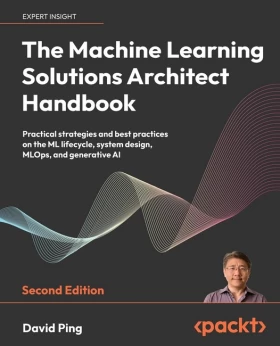
The Machine Learning Solutions Architect Handbook: Practical strategies and best practices on the ML lifecycle, system design, MLOps, and generative AI
1'400 ₴

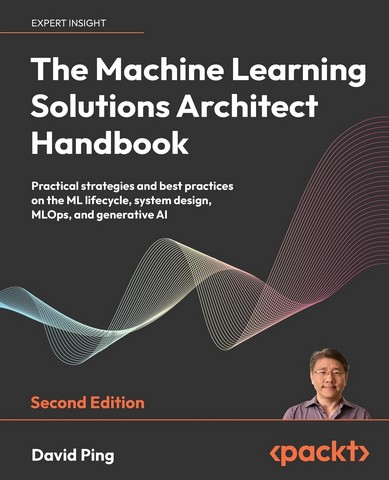







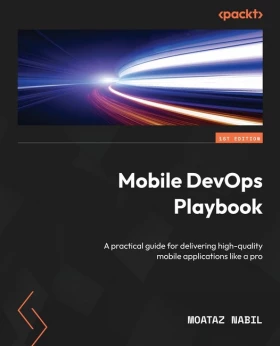

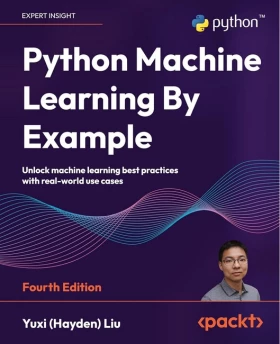
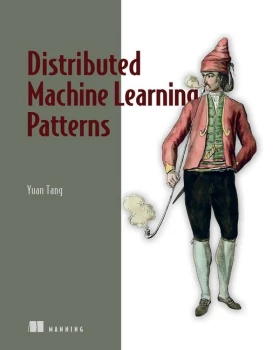




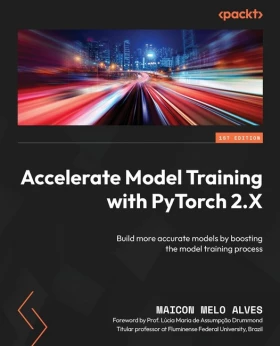


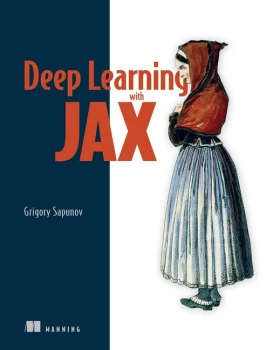


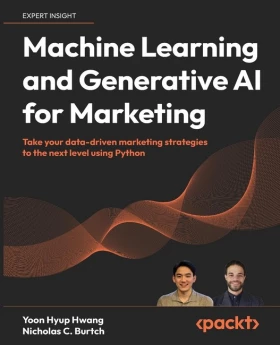

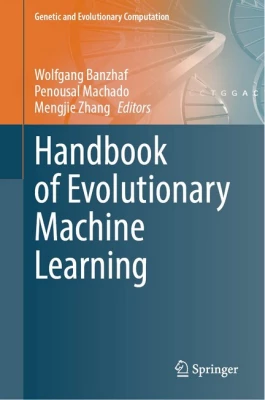





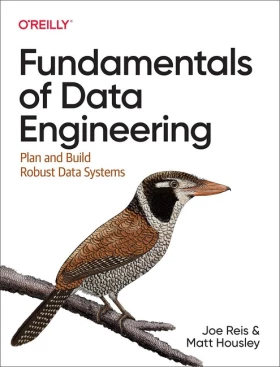




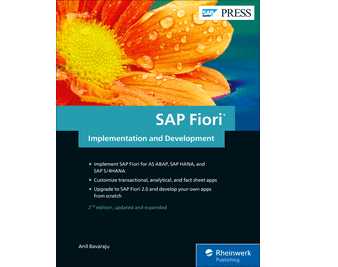



Відгуки про The Machine Learning Solutions Architect Handbook: Practical strategies and best practices on the ML lifecycle, system design, MLOps, and generative AI